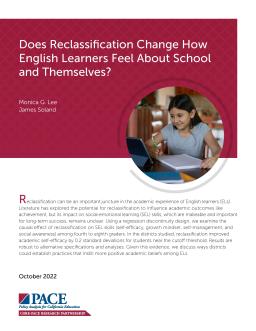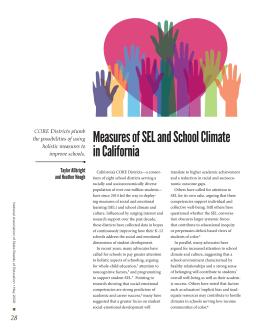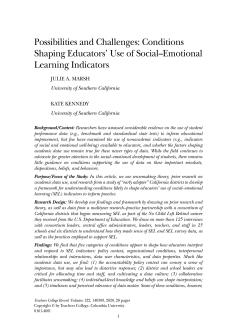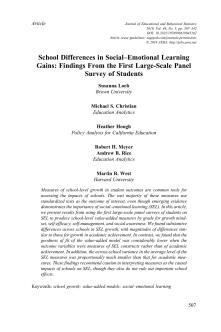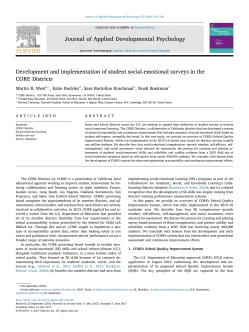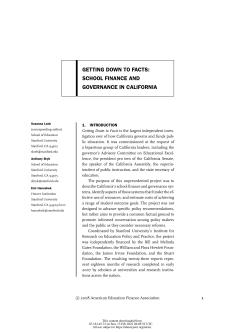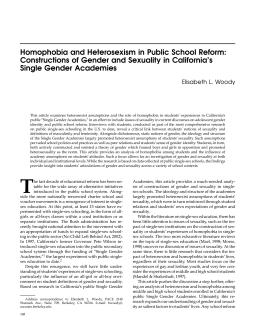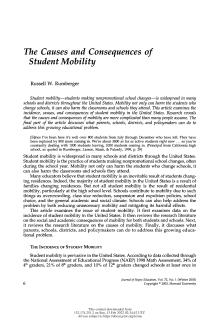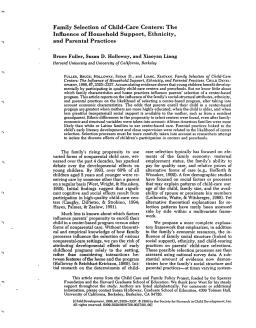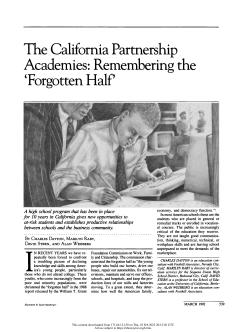Published
Summary
This study explores the impact of reclassification on social-emotional learning skills (SEL) of English learners (ELs) in grades 4 to 8. Using a regression discontinuity design, the study found that reclassification improved academic self-efficacy by 0.2 standard deviations for students near the cutoff threshold. The results suggest that reclassification can positively influence the academic beliefs of ELs and the authors provide recommendations for districts to create practices that foster such positive beliefs.
Published
Summary
California's CORE districts have been collecting data since 2014 on social and emotional learning (SEL) and school climate and culture to improve K-12 schools' holistic approach to student development. Advocates argue that a focus on SEL and school culture will lead to higher academic achievement and better well-being for students. The CORE districts developed survey instruments for SEL competencies and school climate perceptions involving students, staff, and parents. Many states and districts have adopted SEL-specific curricula and disciplinary reforms.
Conditions Shaping Educators’ Use of Social-Emotional Learning Indicators
Published
Summary
This article explores the use of nonacademic indicators such as social and emotional well-being in educational improvement. The authors suggest that while there is little guidance on using these indicators, understanding the conditions that shape the use of academic data can help develop a framework for using social-emotional learning (SEL) indicators to inform practice. The article draws from sensemaking theory and research from a study of early adopter districts in California to develop this framework.
Findings From the First Large-Scale Panel Survey of Students
Published
Summary
This article discusses the use of standardized tests as the primary tool for assessing school-level growth in student outcomes, despite the emerging importance of social-emotional learning (SEL). It presents results from large-scale surveys of students on SEL constructs, and finds significant differences across schools in SEL growth, with magnitudes of differences similar to those for academic achievement. However, caution is recommended in interpreting measures as causal impacts of schools on SEL, as the goodness of fit of the value-added model was considerably lower for SEL measures.
Published
Summary
States and school districts across the U.S. are seeking to expand their definition of student success to include social-emotional learning. The CORE Districts, a collaborative of California districts that has developed a system of school accountability and continuous improvement that includes measures of social-emotional skills based on student self-reports, exemplify this trend. In this case study, we provide an overview of CORE's School Quality Improvement System, which was implemented in the 2015–16 school year across six districts serving roughly one million students.
School Finance and Governance in California
Published
Summary
Getting Down to Facts is an extensive investigation of CA's public education system commissioned by a bipartisan group of CA leaders. The project aimed to describe California's school finance and governance systems, identify obstacles hindering resource utilization, and estimate costs to achieve student outcome goals. The project resulted in 23 reports by scholars, which highlight that the current school finance and governance systems fail to help students achieve state performance goals, particularly those from low-income families. The reports provide a framework for assessing reform options.
Constructions of Gender and Sexuality in California’s Single Gender Academies
Published
Summary
This article examines the impact of heterosexist assumptions and homophobia on students' experiences in California's public "Single Gender Academies." Interviews with students reveal a critical link between sexuality, masculinity, and femininity, and the ways in which assumptions about sexuality are embedded in school policies, practices, and peer relations. The article provides an analysis of homophobia among students and the influence of academy assumptions on students' attitudes towards gender and sexuality.
Published
Summary
This paper examines the incidence, causes, and consequences of student mobility in the US. Mobility not only harms the students who change schools, but also the classrooms and schools they attend. The causes and consequences of mobility are more complicated than many people assume. The authors suggest ways for parents, schools, districts, and policymakers to address this growing educational problem.
The Influence of Household Support, Ethnicity, and Parental Practices
Published
Summary
An investigation of the family factors and practices that influence parents' choice of center-based programs for young children. Maternal education, child's age, and availability of social support were found to be significant factors in center selection. African-American families were more likely to choose center-based care than white or Latino families, and parental practices related to early literacy development and close supervision also affected center selection. The study highlights the importance of considering selection processes when assessing the effects of early childhood programs.
Remembering the "Forgotten Half"
Published
Summary
US high school students, especially those who do not attend college, have been found to lack skills and knowledge necessary for the job market. The California Partnership Academies program has been developed to address this issue and has been adopted by over 50 high schools. The program has received support and positive evaluations. Factors contributing to the issue include societal changes, the education system, and changes in the labor market. If these issues are not addressed, the US risks falling behind international competitors and a lower standard of living.
